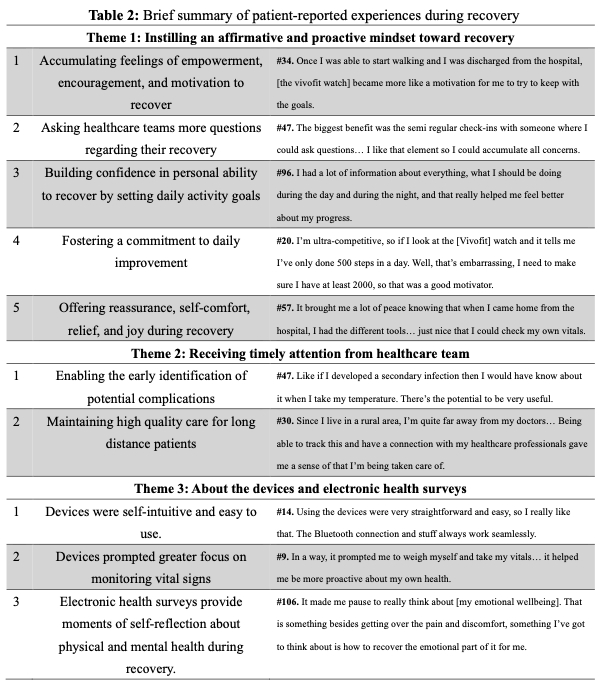Back to 2024 Abstracts
THEMATIC ANALYSIS OF EXIT INTERVIEWS IN A RANDOMIZED CONTROLLED TRIAL FOR A REMOTE PERIOPERATIVE TELEMONITORING PROGRAM
Darrell Fan
*1,2, Patricia Esslin
2, Virginia Sun
2, Oluwatimilehin Okunowo
2, Andreas M. Kaiser
2, Isaac B. Paz
2, Mustafa Raoof
2, Aaron Lewis
2, Kurt Melstrom
2, Lily L. Lai
2, Yanghee Woo
2, Gagandeep Singh
2, Yuman Fong
2, Laleh G. Melstrom
21Johns Hopkins University, Baltimore, MD; 2City of Hope, Duarte, CA
Introduction: Remote patient telemonitoring programs offer the potential to enhance patient access and communication with their medical providers. This study aims to assess the patient-reported experience during perioperative telemonitoring for complex gastrointestinal oncologic surgery.
Methods: Between October 2021 and July 2023, gastrointestinal cancer patients were enrolled in the remote telemonitoring trial and randomized into the intervention or enhanced usual care arm. All patients received devices to track perioperative activity, vital signs, and symptom monitoring via an electronic app. While the enhanced usual care arm adhered to standard protocols for problem reporting, the intervention arm received active nursing support for monitoring data deviations from predetermined thresholds. The program culminated in a 15-minute exit interview comprised of 9 total questions to gather insights into the patient experiences with device usage, symptom reporting, and communication with the healthcare team. Thematic analysis was conducted on all responses to present a patient-centric summary.
Results: Of the 112 patients completing the study, 100 patients (89%) participated in the exit interview. The median age was 52 (range 47-64), and 44 (44%) were female. The majority of enrolled patients (n=68) were diagnosed with colorectal cancer. 51 patients (51%) underwent neoadjuvant chemotherapy and 57 (57%) underwent laparoscopic or robotic-assisted surgery. Postoperatively, patients in the intervention arm reported significantly greater ease and accessibility in electronic data reporting and communication with healthcare team compared to the enhanced usual care arm (94.23% vs 68.75%; p=0.001). Qualitative analysis identified three major themes shared by patients to describe the program: “instilling an affirmative and proactive mindset toward recovery�, “receiving timely attention from healthcare team�, and “device usage and electronic health surveys�. The subthemes highlighted an appreciative and empowering mindset among most enrolled patients. Constructive feedback on device usage and program design informed future changes to optimize the user experience with a remote telemonitoring platform.
Conclusion: The majority of enrolled patients expressed satisfaction with participating in the program to facilitate their postoperative recovery. These positive testimonials present a promising outlook for the future implementation of a remote perioperative telemonitoring program from the patient perspective.


Back to 2024 Abstracts

